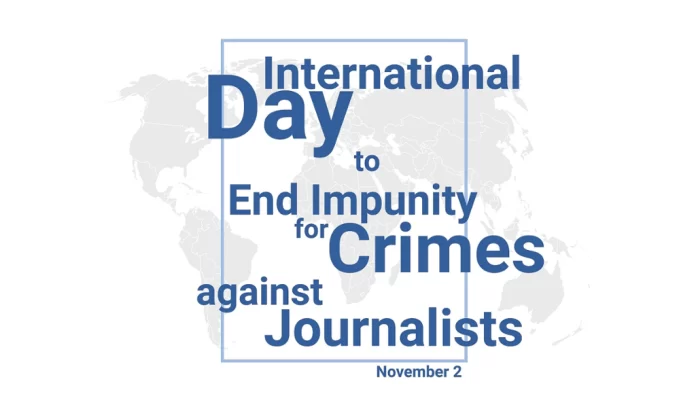Theme:- Keep Truth Alive: “Protect Journalists, Protect the Truth”
The International Day to End Impunity for Crimes against Journalists (IDEI) is an UN-recognized international day observed annually on 2nd November.
The day was declared to be marked on November 2 in the United Nations General Assembly resolution A/RES/68/163. The resolution calls on all member states to take concrete steps to combat the culture of impunity in their countries.
The day was chosen in commemoration of the assassination of Claude Verlon and Ghislaire Dupont, two French journalists from RFI radio station, who were kidnapped from the town of Kidal in Mali after they had finished interviewing a local political leader on November 2, 2013.
According to UNESCO, in the past decade, a journalist has been killed on average every four (4) days. The year 2019 shows the lowest death toll recorded by UNESCO in the last decade with 15 deaths. In 2019, the highest number of fatal attacks occurred in Latin America and the Caribbean region representing 40% of the total killings registered worldwide, followed by Asia and the Pacific Region with 26% of the killings. Most journalists were killed in countries with no armed conflict.
Similarly, the Committee to Protect Journalists (CPJ) says 24 journalists and media workers were killed in Nigeria between 1992 and 2022. They were killed in relation to their work and mostly with motives unconfirmed as the inability to do proper and adequate investigations leading to prosecution consistently encourages impunity for Crimes against Journalists.
Since 2013, the international commemoration of the International Day to End Impunity for Crimes Against Journalists (IDEI) has provided a unique opportunity to raise awareness and promote a productive discussion among all actors involved in the fight against impunity for crimes against journalists. Not all nations welcome freedom of expression, and being a journalist may be a dangerous profession. According to the United Nations, between 2004 and 2014, more than 700 journalists were slain. An alarming number of these fatalities result from either unresolved murder or shooting in crossfire/ combat. Only a limited fraction of these have resulted in a criminal conviction so far.
Journalists play a significant role in the attainment and realization of good governance which is the end result of a virile, viable, and sustained democracy. Journalists research, write, edit and publish news, features, and articles. Their work appears on television, radio, in magazines, journals, and newspapers both print and online. They are the invisible branch of government. They are society’s watchdogs and are the most conspicuous supporter of the right to free expression. A good journalist has a solid ethical foundation. When it comes to reporting on everything from business news to politics, fairness, honesty, and impartiality are essential. Anyone who considers himself a journalist adheres to a code of ethics. It is comforting to know that there is something put in place to ensure we have unbiased and ethical reporting since they(journalists) are dedicated to discovering and communicating the truth to the public. Journalists must give a balanced viewpoint, and provides individuals with the most up-to-date information accessible, allowing them to make educated choices about all areas of their lives.
Journalists play a vital role in fostering a society based on the open discussion of facts and the pursuit of the truth, as opposed to one based on rumor, prejudice, and the naked exercise of power. As a result, journalists are often literally in the line of fire and deserve special protection.
However, journalists need to work towards the attainment of sustained professional excellence in their duties and general disposition. Credibility can best be attained by a profession that develops its members to embrace best practices and global realities in its operations. Journalists are urged to communicate effectively to be understood by the public. Efforts must be made at all times to be unbiased and give equal treatment to all stories. Inaccuracy leads to attacks, hence, accuracy is very important. There is a dire need for training and retraining of journalists thereby building and enhancing their capacity.
On a day like this, the Society for Journalism Enhancement Initiatives enjoins government at all levels to protect journalists and ensure a favorable environment for them to carry out their duties. The media have the responsibility of holding the government accountable to the people. This position is guaranteed by the Nigerian constitution and other international instruments. Governance should uphold the spirit and letter of this provision by according to the needed respect for media workers and ensuring their safety in the performance of its function as the fourth estate of the realm. The citizenry also needs to understand the delicate role of the media as arbiters in the public discourse that must be trusted to clarify the goals of society. It is within the duty of the citizen to defend the freedom of speech and of the press.
It is in recognition of this importance that the United Nations (UN) set aside November 2, every year as the International Day to End Impunity for Crimes Against Journalists. A free and open society is the bedrock of development in any society and only a positive disposition to the media can engender such a society. Government agencies must ensure that those who commit crimes against media workers are brought to the book to stem the reign of impunity. Oppression and impunity must not be condoned in any democratic society.
Gbemiga Bamidele,
Chairman/Convener,
Society for Journalism Enhancement Initiatives.






